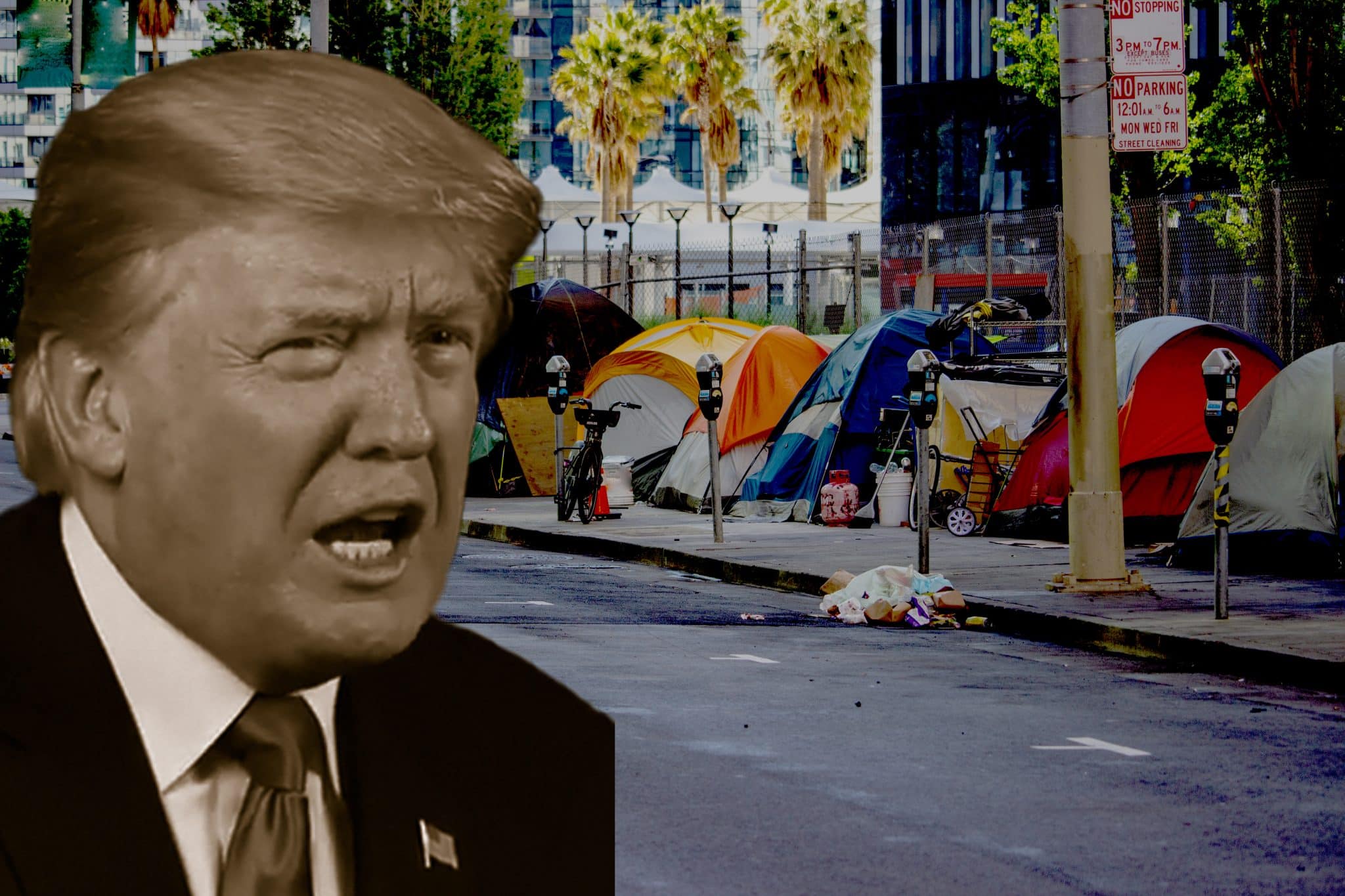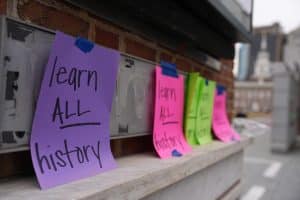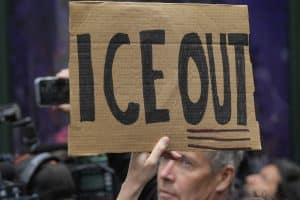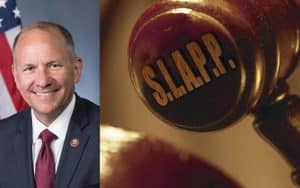President Trump issued an executive order on July 24 entitled, “Ending Crime and Disorder on America’s Streets.” The order falsely blames people experiencing homelessness for “endemic vagrancy, disorderly behavior, sudden confrontations, and violent attacks.”
Trump claimed, “By the authority vested in me as President by the Constitution and the laws of the United States of America, it is hereby ordered” individuals experiencing homelessness will be institutionalized once unspecified government agents determine them to be mentally ill or substance abusers.
Ruth Boone, treasurer and regular over-night volunteer at Bucks County’s Coalition to Shelter and Support the Homeless (CSSH), reacted swiftly and plainly to the news of President Trump’s order. “Oh my god,” she exclaimed.
“Shifting homeless individuals into long-term institutional settings for humane treatment through the appropriate use of civil commitment will restore public order,” the document claims.
Boone doesn’t know what disorder the president is talking about. She rejects the notion that the population that attends their code blue shelter is lawless.
“That’s absolutely false,” she said. “First of all, the people who pick up our guests in the vans give a cursory assessment to make sure that the individual isn’t visibly under the effects of alcohol or drugs. If they suspect an individual is, they’re to call the police.”
But, Boone said, that’s never happened – even with last year’s record-setting census.
“In my experience, and I’ve been with the organization for 10 years, the population that comes to us is generally very compliant, grateful, calm,” she said. “You know there is absolutely a subgroup that might be recovering and/or in treatment, but we generally get people who just need to get out of the cold.”
Concerned for the rights of the unhoused with whom she deals regularly, she sees the directives coming down from Washington and Harrisburg as increasingly out of touch.
“Well, that’s what they do. They make a sweeping, shoot-from-the-hip assessment and you know, what about due process? Embracing democracy is totally ignored. We find ourselves in very dangerous times,” said Boone.
Boone is not alone.
“It feels like we’re working our way towards a militaristic society where if you can’t prove that you’re in a house or have a job, we’re just going to throw you out [of society] – and that’s frightening.” – Estelle Richman, Chief Operating Officer of HUD during the Obama’s administration
Department of Housing and Urban Development (HUD) officials in Pennsylvania have shifted their focus for intakes and how they identify people experiencing homelessness. One of the statewide coordinators agreed to speak with the Bucks County Beacon so long as we did not disclose their identity. This admin explained, for example, that information gathered no longer includes a person’s gender, preferred pronouns or name.
They – and others – hope that recording only biological data will protect people that they fear may be targeted by the government.
But this becomes more complicated for folks who are mentally ill. If the commonwealth stops recording data pertaining to mental health or developmental delay, the person in need of housing will likely drop off waiting lists, which – at this moment – give preferential treatment to vulnerable individuals.
HUD’s vulnerability quotient works – the admin explained – like an emergency room triage, assisting those in greatest need. If the government intends to institutionalize the mentally ill or substance abusers, people will treat intakes like job interviews, rather than an emergency visit.
“If people try to present the best version of themselves, to keep themselves safe, they’re going to seriously lessen their chances of getting housing,” they said.
The state has one recourse – for now – a way to preserve information about applicants.
“There are ways to store data in an encrypted manner so that they [the person seeking housing] are not identifiable and you can’t link it back,” the admin added.
Encrypted data for housing intakes is currently being used for victims of domestic violence but could – theoretically – be used for all housing applicants.
Brian McShane, Associate Director for Pennsylvania and New Jersey at the Corporation for Supportive Housing (CSH), shared his opinion of the new executive order.
“It’s a great way to spend a lot of money,” said McShane. “But it’s not a great way to reduce homelessness.”
McShane hasn’t just guessed that it costs more to sweep people into institutions, CSH has the data.
“We’ve even done some work recently to show, in Pennsylvania itself, just how much cheaper it is,” he said. “How you can get a year of supportive housing for the same amount of money as it costs to hospitalize people for days or to incarcerate people for months.”
And despite the savings, McShane isn’t surprised that some lawmakers would rather round up folks experiencing homelessness than allocate funds for housing and wrap around supports.
“When you isolate the price tag of housing and spend however many millions on affordable or supportive housing or even shelter – which definitely also needs to be part of the solution – sometimes it’s a sticker shock,” he said.
McShane added that if the price of adequately providing necessities is taken in comparison to the cost of homelessness, it’s actually a bargain. “We could spend a whole lot less money and actually resolve these problems.”
And McShane said it would be better for communities, law enforcement and healthcare workers. “Our first responders, our police officers – who quite frankly could be doing other things – would keep us safer.”
Sadly, it’s easier to blame the unhoused than to understand their plight.
“There’s growing animosity towards the folks who have claimed public space, in different ways, since the pandemic. People don’t like having those things [camps] in their neighborhood, on the way to work, or on the way to the library and I don’t think that’s necessarily a wrong response,” explained McShane. “I think it’s just that the answer to that is not locking folks up. The answer is actually investing in the things we know that work, which is housing and support.”
READ: End of Emergency Housing Voucher Program Will Increase Homelessness in Pennsylvania
Lastly, institutionalization isn’t anything new. Estelle Richman was Chief Operating Officer of HUD during President Obama’s administration. Before that she was Pennsylvania’s Secretary of Public Welfare (now the Department of Human Services). Richman said that the move to de-institutionalize started in the 1960s with President Kennedy.
Fast forward two decades to 1988, when Governor Robert Casey decided to close the Philadelphia state hospital, Richman was recruited to be area director for southeast Pennsylvania Office of Public Health and the Department of Public Welfare. Richman explained what it was like.
“Institutions were killing people. Many people were there without a reason, other than they had nowhere else to go. It was an easy way to just write people off,” she said. “The vision [of de-institutionalization] at that time was that these people could live lives in the community – with support.”
Richman said that, initially, their efforts were supported with funding. Casey redirected an estimated $40 million away from the state hospital and split it equally between a street team dedicated to providing “a housing match” for the released patients and the other half for housing folks who – had it stayed open – would have been institutionalized in the not-too-distant future.
Over time, and in other parts of the country, Richman recalled, promised funding dried up.
“The Money didn’t truly follow the people. So, what you found was people being discharged from institutions with appointments but no watches, no time sense and no ability,” she said. Especially folks who were released after 20 years or more. “People were disoriented to time and space.”
Richman said that in her experience there was never a match between the supply of support services and the number of people who needed them.
Richman criticized the new executive order, emphasizing that the basic flaw in the government’s promise to clear the streets of persons experiencing homelessness is that only a fraction of those individuals have mental illness, intellectual disabilities or substance abuse problems.
“Homelessness is caused by poverty,” Richman stated emphatically. “These are poor people. Yes, some of them have mental illness but for the vast majority of people who are experiencing homelessness, it’s [caused] by poverty.”
As for laziness, Richman responded, “Many of them are working. They just don’t have enough money to pay the rent.”
Richman’s concerned. “In many states, I doubt it [the executive order] will recreate the institutions that we’d struggled to close for 40 years. What it will really do is strip people of their civil rights, their legal rights and their ability to live and work in our country.”
She continued, “For the most part what these people suffer from is poverty, and what we’re now saying is that they’re going to be put in jail because they’re poor. The jails don’t have the room. And jails have sentencing – in state mental hospitals, you could be there forever. My fear: we’re going to create institutions that have no length of stay. People could be there forever because they’ll have no way to get out. We are going to create something that we can’t end.”
Sam Tsemberis, PhD, is the executive director and founder of Pathways Housing First Institute. Housing First is a highly successful initiative providing housing to individuals experiencing homelessness before they are expected to wrap their hands around the other factors contributing to their struggles.
The National Low Income Housing Coalition cites an 88 percent success rate for the Housing First Program that Tsemberis created.
READ: Listen to the Voices of the Homeless
Tsemberis, a clinical psychologist, started his career doing street outreach. “I was working under the [Mayor Ed] Koch administration in New York. We would drive around in a van – a psychiatrist, the social worker, nurse – we would talk to people on the street. If we thought that they were in danger to themselves or others, under the Mental Hygiene Law, we would bring them to Bellevue psychiatric hospital. So, this idea of involuntary treatment for people with severe mental illness who are homeless is very familiar to me.”
So familiar that Tsemberis decided there had to be a better way.
“We kept data on what happened to people and what typically happened is that they were hospitalized,” he said. “Yes, there was an emergent problem. Usually not psychiatric … like just severe medical neglect and we would take them to the hospital and they would stay there for like you know 3 or 4 weeks, and then they would be discharged back to the street.”
Then, he said, a cycle began, “Where the neglect would begin all over again and we had to wait until the person met the Mental Hygiene Law criteria, and needed to go to the hospital and then they’d go back on the street.”
Tsemberis said that it’s not just that the president’s idea won’t work, but it’ll be enormously costly to try.
“This idea of going back to that kind of treatment makes no sense at all. Not from a clinical perspective and not from a financial perspective,” said Tsemberis. “Thirty days in the hospital today at about $3,000 a day is $90,000 that we’ve spent on taxpayer money to do the acute treatment.”
Then what? “$90,000 and the person is discharged back to homelessness. We could pay someone’s rent for five years.” Tsemberis concluded, even if done legally – as the New York Mental Hygiene Law was, “It’s not really a solution.”
But if Richman, who is currently president of the board of Project HOME in Philadelphia, is right and Trump’s executive order is enforced without concern for due process, or release dates, the outlook is significantly more grim than a cycle of homelessness.
Richman concluded, “It’s a sinister way to take people – some of which may need treatment, some of which may need other kinds of support, and that group is just being written off all together. It feels like we’re working our way towards a militaristic society where if you can’t prove that you’re in a house or have a job, we’re just going to throw you out [of society] – and that’s frightening.”







